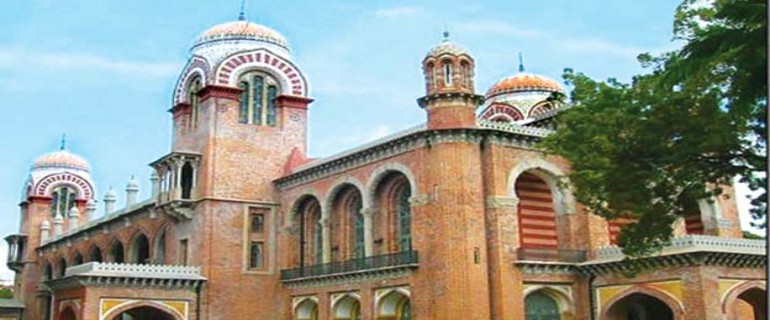The University of Madras is a public state university in Chennai, Tamil Nadu. Established in 1857, it is one of the oldest and premier universities in India. Madras University is the mother of almost all the old Universities of south India. The University area of jurisdiction has been confined to three districts of Tamil Nadu in recent years. This is consequent to establishment of various universities in the State and demarcation of the University territories. This University has been growing from strength to strength while widening its teaching and research activities.
The University imparts both Under Graduate and Post Graduate Education through the Affiliated Institutions which are spread over the districts of Chennai, Thiruvallur and Kancheepuram. Apart from teaching, research activities in Arts, Humanities, Science, Management and Technology shpae the academic tenor of the University. A number of institutions affiliated to Madras University concentrate on research activities offeringe Ph.D., Programmes in their respective field of specialisation.
The University also offers teaching and research programmes in its four campuses. The 68 University Departments of study and research are spread over four campuses organised into 18 Schools each of which offer Post Graduate Courses in respective specialisation, part time and full time.
The first ever demand for higher education in Madras Presidency was given in a public address to Lord John Elphinstone, Governor of Madras, signed by 70,000 residents when the Governor in Council was contemplating "some effective and liberal measures for the establishment of an improved system of national education." This public petition, which was presented by the Advocate General Mr. George Norton on 11 November 1839, pressed the need for an English college in the city of Madras. Pursuant to this, Lord Elphinstone evolved a plan for the establishment of a central collegiate institution or a ‘university.’ This university had twin departments – a high school for the cultivation of English literature, regional language, philosophy and science, and a college for instruction in the higher branches of literature, philosophy and science.
The University Board was constituted in January 1840 with Mr. George Norton as its president. This was the precursor of the present Presidency College, Chennai. A systematic educational policy for India was formulated 14 years later by Wood's despatch, which pointed out the rationale for "creating a properly articulated system of education from the primary school to the University." The Dispatch recommended the establishment in the universities of Professorships "for the purposes of the delivery of lectures in various branches of learning including vernacular as well as classical languages." As a result, the University of Madras, organized on the model of the University of London, was incorporated on 5 September 1857 by an Act of the Legislative Council of India.


